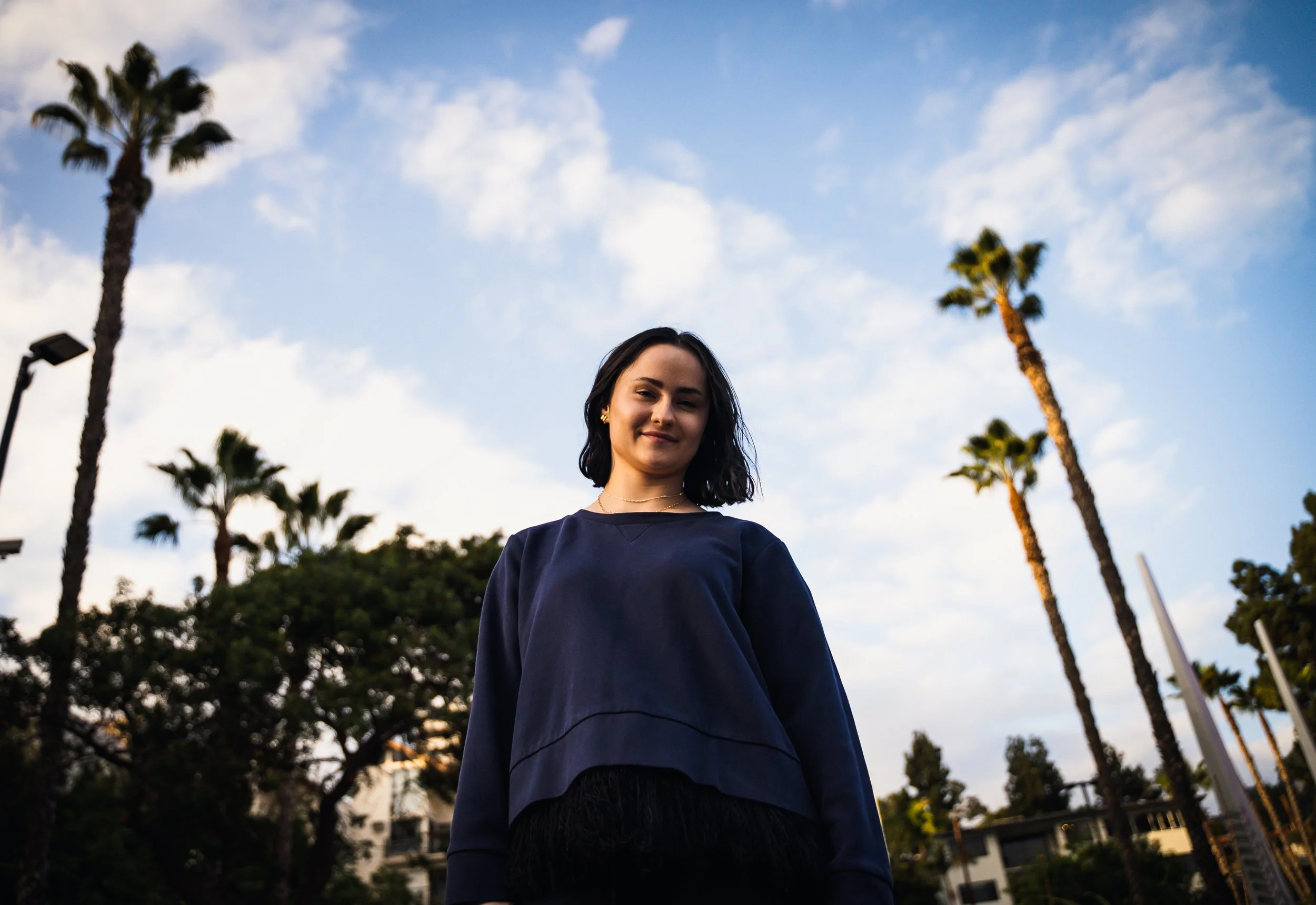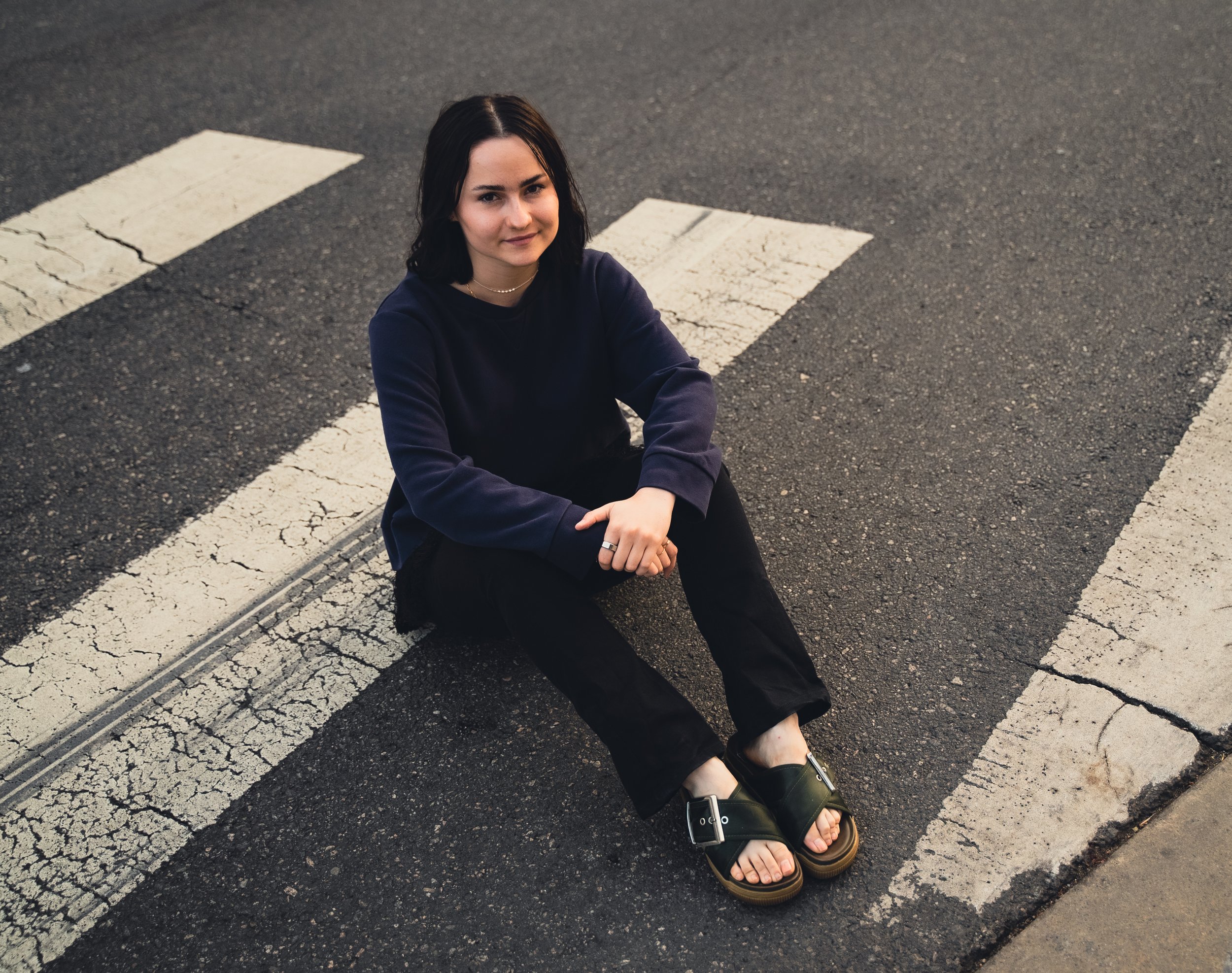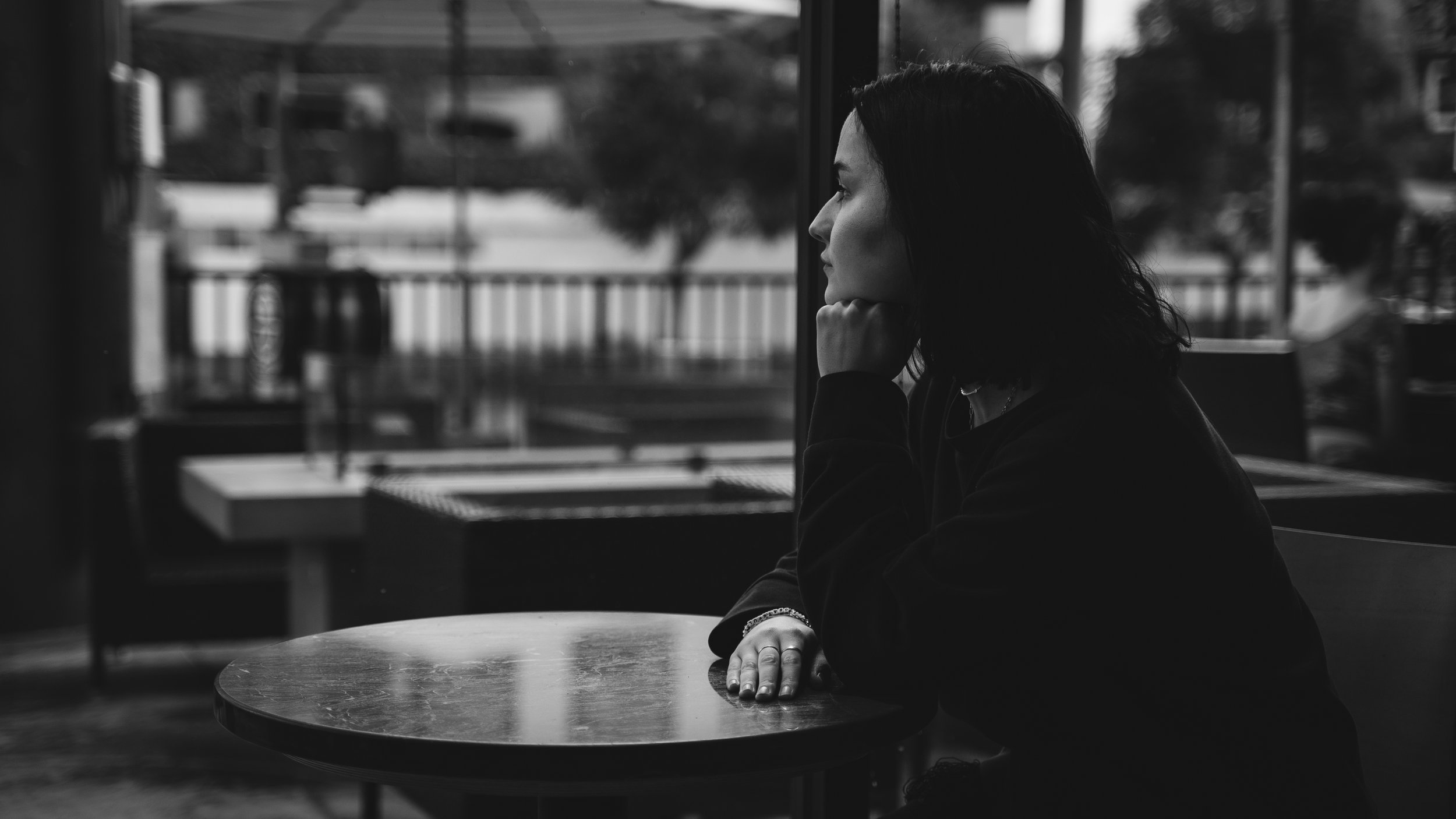Gena & the open mic
Spotlight
The room is dark. It’s quiet besides the murmur of a couple in front. It’s the smallest room with a stage that I’ve seen. There's eight people scattered amongst 20 tight seats. The host gently roasts the previous comedian and introduces Gena. She is about to start her open mic.
Open mics are a chance for Gena to test out new material. She spends weeks gathering ideas and whittling them down until she’s ready to hit the stage. Gena describes the feeling right before she’s invited up, “I find there's a moment right when I get on stage where everything changes really drastically. Once you're on the stage, the world isn't real anymore.”
“What I mean by that is right before I go on I'll be in my head. I'll be planning things out. Asking a bunch of questions. What if this happens? Who's gonna think what of my set? But then I find the moment you get up there that all fades into the background. The performance is coming out of your mouth at that point. The only thing you can focus on is the stories you're telling. You're getting up there with blinders. Full speed ahead. I find that the more you do it the more bulletproof you get.”
I asked her what she thought of her performance afterwards, “When I got on stage it was very chatty. It's not usually like that. If anything it's the opposite. People are disengaged from each other. You'll see people scrolling on their phones, looking at their notes, not even paying attention to what's going on on stage. Everyone's kind of there for themselves.”
“You see a bunch of oddballs doing stand-up in L.A. You can't even imagine the characters you run into. I could tell a lot of people were working on things, trying to find their voice, trying to find their jokes in the process. That's all part of it.”
Beginnings
The journey of a stand-up varies wildly from person to person. Gena’s been at it for 4 years. She tried many things growing up including ballet, cross country, choir, a capella, theater and musicals. The common thread was performance. When she found herself in college she was flooded with clubs to join. She recalls coming across a bagel eating club but her sights were set elsewhere. During her freshman year a mentor recommended sketch comedy. Gena was able to work on her performance skills while also being introduced to an entirely different beast. Writing.
She tells me about her college sketch comedy experience, “I think it was the only group I got into. It was super fun. Truly one of the highlights of my college experience. I liked it even more than the theater I did in high school because we were writing, acting, and directing. I got to learn how to actually write comedy. I found my niche. I grew as a person and got really close with all of my fellow cast members. I enjoyed the writing part more than I would have expected. I had never done any kind of writing and I thought I couldn't do it. This is a new thing that I can explore.”
New to the scene
Gena hadn’t fallen in love with her academic pursuits by the time senior year rolled around. She made the move to LA in 2018 to pursue comedy. She moved here with the aspirations of becoming a TV writer. She tried improv groups but was unable to get a consistent group together. Stand-up on the other hand requires only you, an idea and an audience. It's in this simplicity that Gena found her outlet. I asked her about the challenges of starting stand-up in LA. She says, “Oh, so many. One of the biggest ones is not knowing anybody and feeling like an intruder when you first go into an open mic.”
“There's cliques within the comedy scene and when you first start out you feel like everyone's watching. Of course, they're not, they don't care but it feels like you're walking into a party where you don't know anybody. [Another challenge] is not being fully comfortable on stage. Not having confidence to deliver your jokes with a lot of promise. That takes time to figure out how to use your voice correctly, how to use a mic stand. How to deliver something in a way that doesn't make the audience think you're about to faint.”
Gena has found success with mining material from her own life. Her lived experience provides her the best, most resonant material. Gena says, “As I'm trying to break into the entertainment industry, stand-up ended up being the perfect thing to sink my teeth into. I get to perform. I have to write all my own stuff and you get the exposure that you would want to break into this world. I fell into stand-up because it felt like the most convenient pursuit to come out here alone and do. I ended up really, really loving it. I have so many friends out here that I'm really close to and it has become a core part of me.”
“I feel most grateful for the support system. I have friends, family, people in my close orbit that are there for me. [They] are always here to help and are always open to letting me talk about stuff that I'm going through. Comedians in LA are very close and supportive of each other.”
Less traveled
Stand-up is a highly competitive endeavor. It requires years or even decades of writing, touring, performing, and networking. Bill Burr started comedy in 1992 at the age of 23. His first half hour on Comedy Central occurred in 2003. Not only is it a long road, it’s an intense one. Day jobs are followed by night shifts on stage. Gena is always looking for a chance to perform and mold her material. The fuel required for this path must be refilled regularly. I asked where she got hers.
“Sometimes I don't feel like anything's fueling me. Sometimes this is exhausting. But I would say when you get laughs on stage, even if there's five people, ten people, 15 people in the room, it really is meaningful. There is no feeling like it. When you're up there and you make a group of people laugh, no matter how big or small it is, it does so much for your well-being. It gives you confidence. It makes you feel like you're really powerful honestly.”
“I like having an outlet to talk about stuff I've been through. It's almost like a therapy session in that if you have something you want to process you get to go up there and speak your mind and find the truth in it. Also this is a very communal medium right now. We're all in this together, especially in a big city like L.A. There's a lot of comedians trying to come up. People are really kind to each other and supportive. They go to each other’s shows and give each other opportunities. I find that people are good at giving each other feedback and lifting each other up.”
Tough crowd
No one hits the stage running. There are no prodigies. Even veterans have nights where the audience is not on their side. Hiccups are inevitable. Gena recalls a time she bombed at a pizza parlor in a strip mall. A quiet mic, a fully lit audience, and a strobing spotlight did their best to throw her. “I know I'm bombing when I feel myself sweating. That's when it's bad. It wasn't a huge room. It was maybe 30 people. You could see every individual's face.”
“There was a girl wearing this full goth outfit with elaborate makeup and it was very distracting. It was my first set back from the pandemic. I had all this material I had been doing for Zoom shows because that's what people were doing. Over Zoom people were a lot more generous.”
“I got up being very confident and immediately got the feedback that it was not working. You know it's bad when the person who goes after you does a great job. You can't blame the crowd. I remember very little laughter and most people in the crowd looked extremely bored. I do remember the guy who was hosting the show. His parents were there. They were laughing really hard at everything.”
“Usually what you do is you can say a comment that addresses the situation. The audience likes when you address the uncomfortable truth. It's what they're thinking and they like when someone says it out loud. I remember thinking, you know what, I have all this material written down that I wanted to do tonight. I'm gonna finish it out and say it word for word. If this is the learning experience for me to know that it's not good then now I know for sure.”
“[The audience] is as much of an important part of it as you are. Whether you like it or not, you have to win them over. Every comic has been through the situation where you have something that you are 100% convinced is funny and you never get the feedback you want. Everyone's been through that. What I found is that the more skilled you get, the more you have an ability to push the audience to believe what you're saying is funny.”
Happy birthday
Gena has made some amazing memories as well. She produces two different comedy shows at local clubs. She recalls one she threw around the time of her birthday, “The room filled up infinitely more than I was expecting. I had such a packed house in this really cool space and everyone on the show did so well. At the end of the show, the photographer took this photo of me standing in front of my whole audience. I have this epic photo of me and a lot of my friends and a lot of people I didn't know who looked like they were having the time of their lives. I felt like I had really put on something special.”
Universal language
“No matter who you are, where you're from, what kind of person you are, or where you live, I think laughing is something no one can deny is an amazing thing. It’s something that bonds a lot of people together. What's really powerful about comedy is how it can break tension. People are drawn to comedy because it helps them heal in a way.”
“I find that comedy as a medium feels so much more authentic and puts me in a much better mood rather than something very artistic or dramatic or very intense. It all feels a little too self-important to me, whereas comedy feels a lot more organic. No matter who you are, everyone loves being in a good mood and having a laugh.”
Gena B. Jones | October 22, 2022







